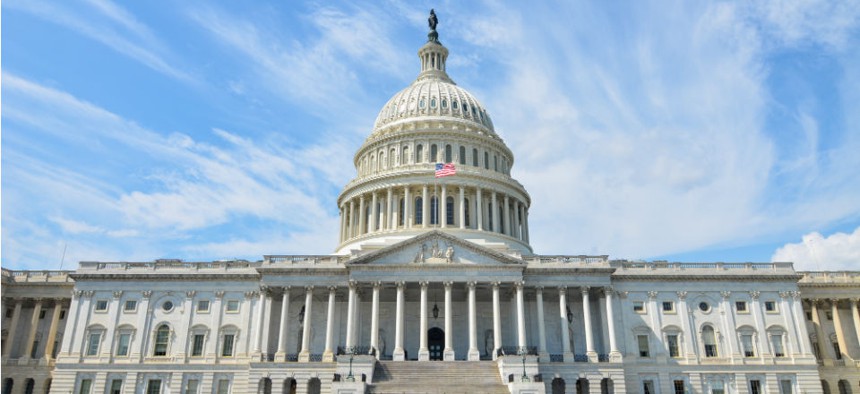
Orhan Cam / Shutterstock.com
GOP Can't Stop a Lame-Duck AG Pick
Obama's nominee can get confirmed in December, though Republicans could exact revenge later.
The White House had every incentive in the world to kick the naming of a new attorney general until after the midterm elections and almost no reason not to.
The simple fact of the matter is this: Senate Republicans can holler about how President Obama will be ramming his pick through a lame-duck Senate, but venting is just about all they'll be able to do about it. In a sense, the battle over a new AG was fought a year ago, when Senate Majority Leader Harry Reid changed the rules for executive-branch nominations.
Because of his trigger of the so-called "nuclear option," there will be no possibility of a GOP filibuster of Obama's pick. And all it will take to confirm his choice will be a simple majority vote. Given that Democrats, at least for the rest of the year, have 55 seats, the onus will be on the White House, Reid, and Senate Judiciary Committee Chairman Patrick Leahy to hold their caucus together, not to court Republicans. And that will become much easier without the threat of an election looming.
That may explain why the White House has done so little work to grease the skids. According to a Judiciary staffer, Obama's aides never informed the top Republican on the committee, Sen. Chuck Grassley of Iowa, of the impending departure of Attorney General Eric Holder nor have they reached out to Grassley since it was made public. (Holder's deputy, James Cole, announced Thursday that he is also leaving the department.) Because Democrats hold a 10-8 edge on the committee, a party-line vote to approve the nominee is almost certain unless Obama makes a highly controversial choice or problems emerge during the confirmation process.
That, too, seems unlikely. Two of the favored candidates for the job, Donald Verrilli, the solicitor general, and Thomas Perez, currently the Labor secretary, have already been vetted by the committee. (Perez formerly headed DOJ's Civil Rights Division.) A third leading candidate, Kathryn Ruemmler, the former White House counsel, has not. Longer-shot possibilities, such as Preet Bharara, the U.S. attorney in Manhattan, and Loretta Lynch, the U.S. attorney in Brooklyn, have also been screened by the committee in the past. (A White House aide disputed a report by Bloomberg this week that Ruemmler has emerged as the favorite.)
Leahy's office is using as its model for the upcoming weeks the relatively smooth confirmation in 2007 of Michael Mukasey, then a former federal judge. Like whoever succeeds Holder, Mukasey was coming in on the heels of a controversial attorney general, Alberto Gonzales. Leahy scheduled his committee hearing about a month after President George W. Bush nominated him in September 2007. From there, it was about three weeks to a committee vote. A floor vote was held days afterward, and Mukasey was confirmed, 53-40, in early November. A similar timeline would have Holder's successor confirmed around Christmas, though leaders have been hoping the lame-duck session won't drag on that long. (Bush's first AG, John Ashcroft, was confirmed even more quickly—in about 40 days.)
A Leahy aide said that, as chairman, Leahy has sole discretion as to when a confirmation hearing would be held, but stressed that the White House will need to have a nominee ready to go immediately after Election Day.
Senate Republicans argue that the Mukasey example doesn't apply. He wasn't jammed through a lame-duck session, let alone one in which the Senate was about to change hands. And, as a senior aide notes, Mukasey had bipartisan support (He was recommended by Democratic Sen. Chuck Schumer), something that's not going to happen in this Senate. The White House has also cited Defense Secretary Robert Gates's confirmation during the lame-duck session in 2006 as precedent for quick action.
Still, the power of sweet reason is the only power Republicans have at this point. Theysurrendered their leverage when they took a hard-line stance against approving any of Obama's picks last year to fill slots on the U.S. Court of Appeals in Washington. That gave Reid the excuse to act on his long-standing threat to do away with the filibuster for executive-branch nominees.
None of this means that GOP members of the Judiciary Committee won't use the opportunity to hammer the administration or score talk-show points on a variety of front-page issues. Verrilli, for example, who successfully defended the constitutionality of the Affordable Care Act before the Supreme Court, would give conservatives another opportunity to re-litigate that issue. Ruemmler is certain to be pressed about her role in probing allegations that a White House advance-team member was involved in the 2012 Secret Service prostitution scandal in Colombia, as well as whether the West Wing played any role in the Internal Revenue Service's decision to screen nonprofit political advocacy groups. Last year, Republicans opposed the nomination of Perez as Labor secretary, calling him an "ideologue" and a "liberal activist." All of them undoubtedly would be quizzed on their lack of counterterrorism experience, given the newly existential threat of the Islamic State.
The committee features one probable GOP presidential candidate in Sen. Ted Cruz of Texas—and the hearing could provide him with a megaphone to air his grievances in advance of any formal move toward a run. Cruz, a former Justice Department attorney under Ashcroft, has been an outspoken critic of Holder, even calling for his impeachment over the IRS scandal.
Another Republican member, Sen. Lindsey Graham of South Carolina, likely would grill a nominee over the reports that Obama intends to try to shutter the terrorist prison at Guantanamo Bay, Cuba, through executive order rather than working with Congress, as would Sen. John Cornyn of Texas, a former state attorney general.
Cornyn is one who is likely hankering for further debate on the ACA's legality. He recently urged the Appeals Court in Washington to rehear a lawsuit that argues the law is unconstitutional because its revenue-raising provisions originated in the Senate, not the House. He also could push the nominee on whether a new congressional Authorization for the Use of Military Force is needed to justify U.S. attacks in Syria—something the White House has resisted.
GOP Sen. Jeff Sessions of Alabama, a former ranking member of the committee, could question a nominee—particularly Ruemmler—on the White House's plans for executive action that would grant deportation relief for potentially millions of undocumented immigrants, which will remain an explosive political issue even after the election.
Should Republicans ultimately secure the chamber, the fracas would amount to simply a prologue to what will become an entrenched battle over the remaining two years of Obama's term. Republicans almost certainly will extract a price from both Reid and the White House over the nuclear option (including, perhaps, restoring it), which could make further nomination battles—say, over the Supreme Court, perhaps—brutal affairs. Hard feelings over a rushed AG confirmation process likely will make matters worse.
They may get their first shot to draw blood, in fact, when Obama's new nominee for the Justice Department's Civil Rights Division comes before the committee. Holder tapped Vanita Gupta for the post Wednesday, but the White House hasn't yet set forth her formal nomination. Despite early support from conservatives such as Grover Norquist, it seems unlikely that Senate Republicans will rally behind her. After all, she's currently an ACLU lawyer who has come out for marijuana legalization. In that way, she seems almost tailor-made for a confrontation. Obama will also have to pick a nominee to succeed Cole in the No. 2 Justice job, another opportunity for Republicans to make the administration pay.
(Image via Orhan Cam / Shutterstock.com)







